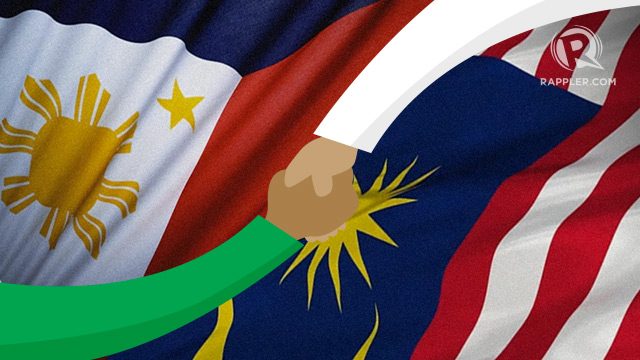SUMMARY
This is AI generated summarization, which may have errors. For context, always refer to the full article.

MANILA, Philippines (UPDATED) – Malaysia’s Mahathir Mohamad,the world’s oldest leader at 93, will be in the Philippines starting Wednesday, March 6 until Thursday, March 7.
This is his first visit since he returned as Malaysia’s prime minister. In his previous term as prime minister, Mahathir had undertaken bilateral official visits in 1987 and 1994.
In 2016, President Rodrigo Duterte, Malaysia is one of the 3 countries – together with the Philippines and India – that can provide a viable solution to the problem which has already “paralyzed trade and commerce in that area.”
The Philippines and Malaysia have enjoyed a bilateral relationship that has already spanned more than 60 years. Rappler lists some of the highlights of that relationship.
Nearly 6 decades of bilateral relations
In 1959, the Philippines first established a diplomatic representative office in the country just after the independence of the Federation of Malaya.
The Philippine Legation was turned into an embassy 3 years later in 1961 with Yusup Abubakar as the first chief of mission.
It was in the same year when then president Carlos Garcia went on a 4-day state visit where he discussed with then prime minister Tunku Abdul Rahman the formation of an Association of Southeast Asian States as a way for countries in Asia to unite and prosper “to bring prosperity and a richer life” to people.
The two countries are among the founding members of the Association of Southeast Asian Nations (ASEAN) created on August 8, 1967.
Together with their counterparts from Indonesia, Singapore, and Thailand, foreign ministers Tun Abdul Razak of Malaysia and Narciso Ramos of the Philippines signed a 5-article document which established an Association for Regional Cooperation among Countries of Southeast Asia (which was later called ASEAN).
The document proclaimed ASEAN as “representing the collective will of the nations of Southeast Asia to bind themselves together in friendship and cooperation and, through joint efforts and sacrifices, secure for their peoples and for posterity the blessings of peace, freedom and prosperity.”
Typhoon aid from Malaysia to the Philippines
Malaysia has given aid to the Philippines for the victims of various disasters in recent years.
In 2013, after the Bohol earthquake, Malaysia provided monetary support to victims, particularly children.
A month after, in the aftermath of Super Typhoon Haiyan (Yolanda), the Malaysian government donated $1 million (P4.9 million)* to help in relief and rehabilitation together with food and medicines worth $310,000 (P15.01 million).
Sarawak, a Malaysian state, also delivered P1.32 million ($27,148) worth of aid to Yolanda survivors a year after in 2014.
Aside from disasters, Malaysia served as a supporter for peace in Mindanao. The country was the main facilitator of the Framework Agreement on the Bangsamoro.
Continuous flow of people between Malaysia and the Philippines
Malaysia is one of the top 5 countries with the largest population of overseas Filipinos.
According to data from the Commission on Overseas Filipinos (COF), there are at least 790,000 Filipinos living and working in Malaysia, while there are an estimated 673,000 Malaysians in the Philippines.
In 2018, meanwhile, 145,242 tourists from Malaysia arrived in the Philippines. The figure is the second highest among ASEAN countries next to Singapore.
Filipino tourists in Malaysia, meanwhile, reached 396,062 in the same period.
One of the problems between the two countries, however, is the number of Filipinos illegally staying in Malaysia.
DFA estimates at least 400,000 undocumented Filipinos in Malaysia. The Philippine government has assisted 5,844 Filipinos since Malaysia’s amnesty program was announced in January 2016
In 2014, Malaysia launched a crackdown on undocumented foreigners. The operation, managed by the Malaysian Home Ministry, was called “Ops Bersepadu”.
It targeted undocumented nationals mostly from from the Philippines, Indonesia, Thailand, Cambodia, Myanmar, Nepal, Laos, Vietnam, Pakistan, Sri Lanka, Uzbekistan, Kazakhstan, India, and Bangladesh. (READ: Brace for Malaysia crackdown, OFWs warned) l
PH’s raw goods for Malaysia’s manufacturers
Traded goods include electronic products, palm oil, mechanical equipment, appliance, metal, processed food, and chemical products, according to Malaysia Trade (Mantrade).
The main goods Malaysia imports from the Philippines, according to Mantrade-Manila commissioner Nyaee Ayup, are raw materials, considering that Malaysia is a “manufacturing-driven economy.”
The Sabah dispute
It has not always been peace between the two as both countries are still locked in a territorial dispute over Sabah, previously known as Northern Borneo.
In 1963, diplomatic and consular relations between the Philippines and Malaysia were suspended for 8 months after they failed to reach a settlement over the dispute. The Philippine embassy in Kuala Lumpur was ordered closed by the host country in September of that same year.
A year before in 1962, the Philippines filed a claim of sovereignty, jurisdiction, and proprietary ownership over the disputed territory. According to then president Diosdado Macapagal, the Philippines was made sole agent by the heirs of the Sultan of Sulu in their bid for ownership.
In February 2013, Agbimuddin Kiram led armed followers of the Sultanate of Sulu to Lahad Datu, Sabah in an effort to impose their claim on the Eastern Malaysian state. The standoff between the sultan’s followers and Malaysian forces led to the loss of 60 lives, forcing over 6,000 Filipinos to flee Sabah.
Three years later, Duterte has consistently said he would pursue the Philippine government’s claim over Sabah.
Najib, however, said in August that he would “defend Sabah’s sovereignty” if given the chance to meet Duterte. Malaysia’s claim over the disputed territory, he added, “could not be questioned and would be defended.” – Rappler.com
*$1 = P48
Add a comment
How does this make you feel?





There are no comments yet. Add your comment to start the conversation.